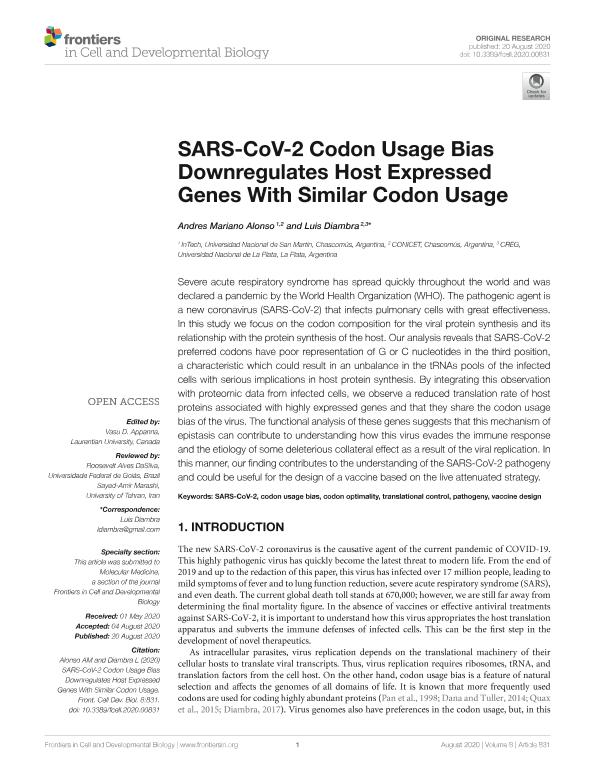Mostrar el registro sencillo del ítem
dc.contributor.author
Alonso, Andrés Mariano

dc.contributor.author
Diambra, Luis Anibal

dc.date.available
2020-09-22T17:06:55Z
dc.date.issued
2020-08
dc.identifier.citation
Alonso, Andrés Mariano; Diambra, Luis Anibal; SARS-CoV-2 Codon Usage Bias Downregulates Host Expressed Genes With Similar Codon Usage; Frontiers Media S.A.; Frontiers in Cell and Developmental Biology; 8; 831; 8-2020; 1-8
dc.identifier.issn
2296-634X
dc.identifier.uri
http://hdl.handle.net/11336/114553
dc.description.abstract
Severe acute respiratory syndrome has spread quickly throughout the world and was declared a pandemic by the World Health Organization (WHO). The pathogenic agent is a new coronavirus (SARS-CoV-2) that infects pulmonary cells with great effectiveness. In this study we focus on the codon composition for the viral protein synthesis and its relationship with the protein synthesis of the host. Our analysis reveals that SARS-CoV-2 preferred codons have poor representation of G or C nucleotides in the third position, a characteristic which could result in an unbalance in the tRNAs pools of the infected cells with serious implications in host protein synthesis. By integrating this observation with proteomic data from infected cells, we observe a reduced translation rate of host proteins associated with highly expressed genes and that they share the codon usage bias of the virus. The functional analysis of these genes suggests that this mechanism of epistasis can contribute to understanding how this virus evades the immune response and the etiology of some deleterious collateral effect as a result of the viral replication. In this manner, our finding contributes to the understanding of the SARS-CoV-2 pathogeny and could be useful for the design of a vaccine based on the live attenuated strategy.
dc.format
application/pdf
dc.language.iso
eng
dc.publisher
Frontiers Media S.A.

dc.rights
info:eu-repo/semantics/openAccess
dc.rights.uri
https://creativecommons.org/licenses/by-nc-sa/2.5/ar/
dc.subject
CODON OPTIMALITY
dc.subject
CODON USAGE BIAS
dc.subject
PATHOGENY
dc.subject
SARS-COV-2
dc.subject
TRANSLATIONAL CONTROL
dc.subject
VACCINE DESIGN
dc.subject
COVID-19
dc.subject.classification
Virología

dc.subject.classification
Ciencias Biológicas

dc.subject.classification
CIENCIAS NATURALES Y EXACTAS

dc.title
SARS-CoV-2 Codon Usage Bias Downregulates Host Expressed Genes With Similar Codon Usage
dc.type
info:eu-repo/semantics/article
dc.type
info:ar-repo/semantics/artículo
dc.type
info:eu-repo/semantics/publishedVersion
dc.date.updated
2020-09-22T14:54:44Z
dc.journal.volume
8
dc.journal.number
831
dc.journal.pagination
1-8
dc.journal.pais
Suiza

dc.description.fil
Fil: Alonso, Andrés Mariano. Consejo Nacional de Investigaciones Científicas y Técnicas. Centro Científico Tecnológico Conicet - La Plata. Instituto de Investigaciones Biotecnológicas. Instituto de Investigaciones Biotecnológicas "Dr. Raúl Alfonsín" (sede Chascomús). Universidad Nacional de San Martín. Instituto de Investigaciones Biotecnológicas. Instituto de Investigaciones Biotecnológicas "Dr. Raúl Alfonsín" (sede Chascomús); Argentina
dc.description.fil
Fil: Diambra, Luis Anibal. Universidad Nacional de La Plata. Centro Regional de Estudios Genómicos; Argentina. Consejo Nacional de Investigaciones Científicas y Técnicas. Centro Científico Tecnológico Conicet - La Plata; Argentina
dc.journal.title
Frontiers in Cell and Developmental Biology
dc.relation.alternativeid
info:eu-repo/semantics/altIdentifier/url/https://www.frontiersin.org/article/10.3389/fcell.2020.00831/full
dc.relation.alternativeid
info:eu-repo/semantics/altIdentifier/doi/http://dx.doi.org/10.3389/fcell.2020.00831
dc.relation.alternativeid
info:eu-repo/semantics/altIdentifier/url/https://www.biorxiv.org/content/10.1101/2020.05.05.079087v1
Archivos asociados
